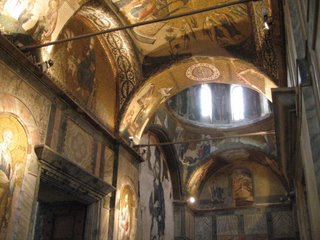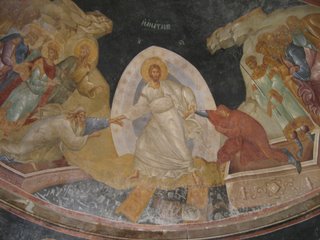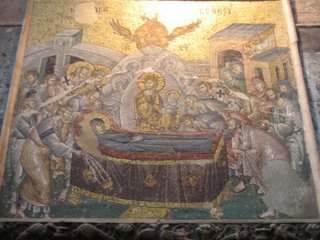In an entry on the Reformed Credenda/Agenda online magazine (http://credenda.org) titled “Why Evangelicals Can’t Write,” [1] writer Peter Leithart laments the lack of literary genius from Western Protestants. The reason he cites: the disappearance of real sacramental theology from Protestantism. He brings up the 1529 Colloquy of Marburg, where Lutherans and Zwinglians (from whom the Reformed and Anabaptist understandings of Baptism and the Supper stemmed) split over—of all things—the “real presence” of Christ in the Communion elements.
For many post-Marburg Protestants, literal truth is over here, while symbols drift off in another direction. At best, they live in adjoining rooms; at worst, in widely separated neighborhoods, and they definitely inhabit different academic departments.
Here is a thesis, which I offer in a gleeful fit of reductionism: Modern Protestants can't write because we have no sacramental theology. Protestants will learn to write when we have reckoned with the tragic results of Marburg, and have exorcised the ghost of Zwingli from our poetics. Protestants need not give up our Protestantism to do this, as there are abundant sacramental resources within our own tradition. But contemporary Protestants do need to give up the instinctive anti-sacramentalism that infects so much of Protestantism, especially American Protestantism. …
In contrast to this Christian affirmation of the cosmos, [Roman Catholic author Flannery] O'Connor saw Manichean impulses behind the modern denigration of material reality, and believed this made fiction writing almost impossible: "The Manicheans separated spirit and matter. To them all material things were evil. They sought pure spirit and tried to approach the infinite directly without any mediation of matter. This is also pretty much the modern spirit, and for the sensibility infected with it, fiction is hard if not impossible to write because fiction is so much an incarnational art." …
Symbols separated from reality and reduced, as they are in much Protestant theology, to "mere signs," cannot do anything, whether in reality or in fiction. They exist as sheer ornament, or, at best, as pointers to some something in some real realm of reality that can do something. But if this is so, then the moment of grace, whether in fiction or reality, never enters this world, into the realm of what-is. Without a sacramental theology, and specifically a theology of sacramental action, Protestant writers cannot do justice to this world or show that this world is the theater of God's redeeming action. …
The renewal of literature, like the renewal of the world, begins in worship. The renewal of literature, like the renewal of the world, begins from the pulpit, to be sure. But the pulpit will renew literature only when it is nestled where it should be nestled, between the font and the table.
Raised in an ecumenical Catholic and Lutheran family and now drifting to and from Reformed understandings, I’ve been met with myriad understandings of the Sacraments (and I mean the only two instituted by our Lord, Baptism and the Supper): known respectively as transubstantiation, consubstantiation, and, for lack of a better word, signification. And to think: as the Western (Catholic) Church separated from the Eastern (Orthodox) over the matter of from whom in the Godhead the Holy Spirit proceeds (i.e., whether he proceeds from both the Father and Son, or from only the Father through the Son), so did the Lutherans and Zwinglians part ways over exactly how it is we receive grace and fellowship with the risen Christ in a cake of bread and a cup of wine.
But Marburg really wasn’t about an inconsequential speck of doctrinal dust. Indeed, the whole of history “plays” at the Table. [2] All the thoughts upon literature and Flannery O’Connor aside (and I just picked up a copy of her complete short stories, which I’m eagerly looking forward to reading this year), the Incarnation is a reality, and whenever we encounter God in this life and the next, it’s bodily, through the raw stuff of this world. I love my edition of the vivid Bible paraphrase The Message: its cover pictures the boards of a splintering, white-washed wall, not glittering gold-leaf embellishments.
I think this is affirmed on a number of levels: (1) The third person of the Trinity is denoted by the Hebrew word ruach and the Greek pneuma. "Both terms mean, specificially, moved and moving air; they mean breath or wind, probably also storm" [3].
(2) God chooses first not to reveal himself in the Old Testament as some sort of esoteric body of knowledge or a Divine Consciousness or something like that, but he comes as a pillar of fire, a cloud of water vapor. His shekinah glory actually shines like the sun; it’s no mere illustration. The psalmist speaks of God’s voice as thunder (Psalms 18, 29). It’s not that God only used these things as inspired imagery; God actually came to people in these ways, as he met godly men in a burning bush or in a storm atop Sinai or in a gentle blowing (or as in the KJV's beautiful rendering, a "still small voice").
(3) God is revealed fully and satisfactorily in becoming the enfleshed Word dwelling among us (John 1:1-3, 14, 18), living a fully human life in a body that breathed, slept, and bled. Jesus said, “If you really knew me, you would know my Father as well. From now on, you do know him and have seen him.” Perplexed, his disciple Philip asks him to show them the Father. What was Jesus' reply? “Don’t you know me, Philip, even after I have been among you a long time? Anyone who has seen me has seen the Father” (John 14:7-9).
(4) That we are all held accountable to God’s self-revelation is true, but through what medium? Spirit? Knowledge? Nay—matter. “What may be known about God is plain to them, because God has made it plain to them. For since the creation of the world God’s invisible qualities—his eternal power and divine nature—have been clearly seen, being understood from what has been made, so that men are without excuse” (Romans 1:19-20, emphasis mine).
(5) God’s main chosen vehicle of revelation is not in some sort of euphoric vision, but in plain ol’ words on a page: scripture. As Scripture is read aloud in human words, God even takes on a human voice. (As an aside, this is part of why I believe biblical “tongues” are intelligible but foreign languages that can be interpreted for others’ benefit, as at Pentecost, not some sort of Spiritual gibberish a la Billy Madison.)
(6) Even the “higher emotions” of life—and surely those of life with God—be they joy, love, grief, relief, etc., are never ours apart from some sort of physical, bodily component. Neurotransmitters like adrenalin and dopamine are released; electric impulses trigger our sympathetic or parasympathetic nervous systems; our blood pressure climbs or ebbs. We perspire or go dizzy. [4]
I don’t know yet where I precisely stand concerning the sacraments (though I’ve been tiptoeing from Calvinistic Reformed [as opposed to Zwinglian] toward the Lutheran understanding), but it’s undeniable that God can be known apart from mediation through matter. To ask God that we come to him apart from his written and spoken Word, apart from human contact, apart from sunrise and vale, font and table, is to seek God not in truth nor on his own terms, but it is to seek the spirit of the world, avoiding the humble, avoiding the cross. Such will be only an exercise in futility; he does not promise to meet us otherwise. Now if only God would reveal himself through baseball!
____________________________
[1] http://credenda.org/issues/18-2liturgia.php; accessed 23 August 2006.
[2] Ref. Eugene H. Peterson, Christ Plays in Ten Thousand Places (Grand Rapids, Mich.: Eerdmans, 2005).
[3] Karl Barth, Evangelical Theology: An Introduction (Grand Rapids, Mich.: Eerdmans, 1963), 53.
[4] See C. S. Lewis’s amazing essay Transposition. (Then again, aren’t all his essays amazing?) Relevant excerpts shall likely be forthcoming on this blog.










